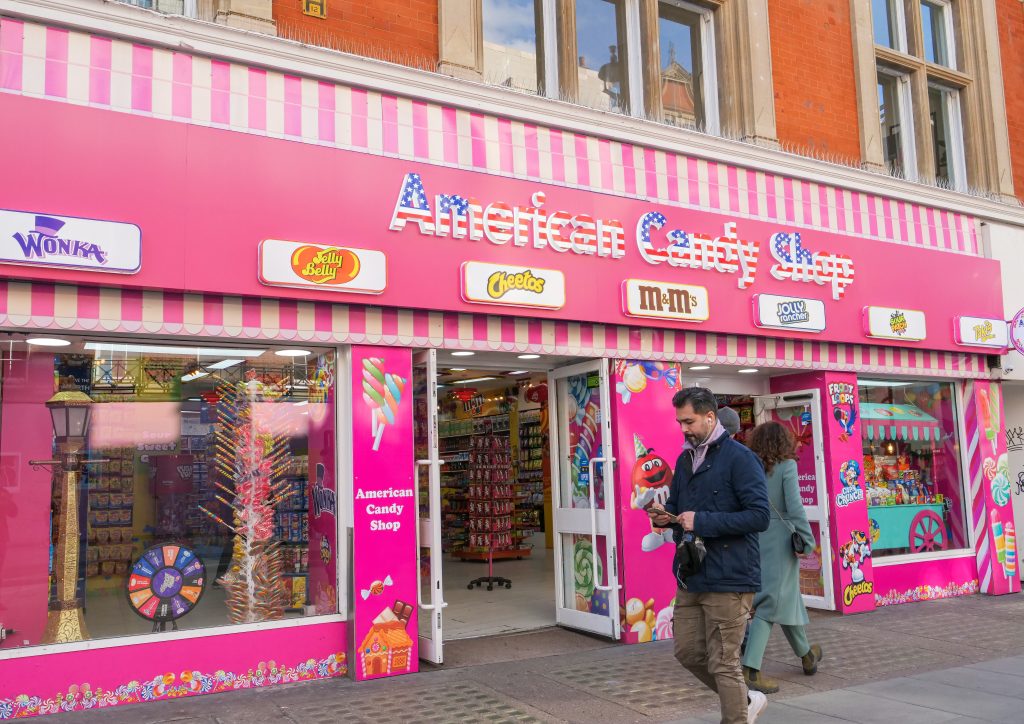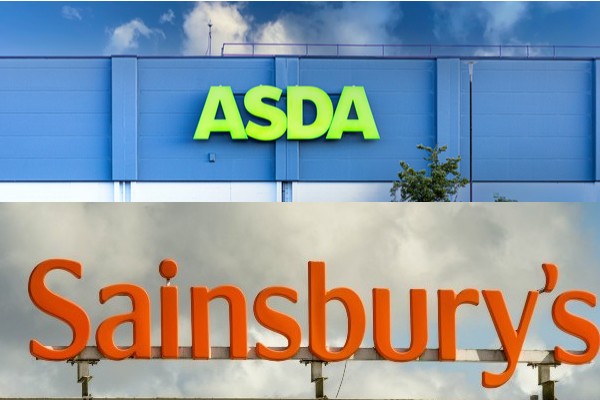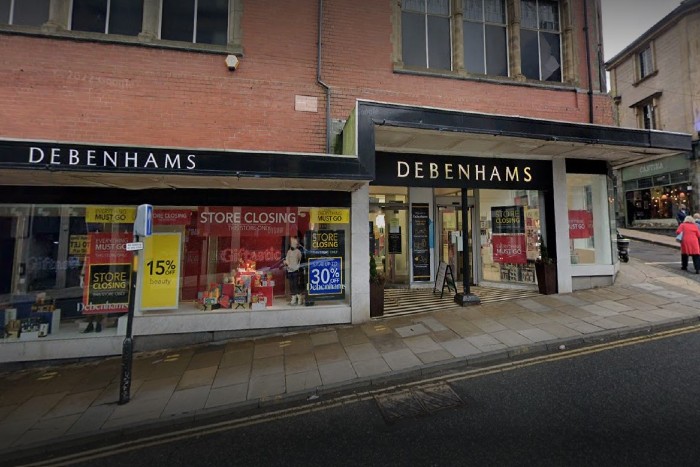For a while now, visitors to Oxford Street have been asking the same question: What is it with all these American candy stores?
From American Candy World to American Candy Land to Candy Surprise, the sight of Willy Wonka chocolate bars and Cheetos is now inescapable on the world’s most famous shopping street.
And it’s making the UK’s premier shopping street look down at heel.
M&S CEO Stuart Machin recently warned that Oxford Street risks becoming a “dinosaur district destined for extinction” as it’s on “its knees” and falling prey to a “growing proliferation of tacky candy stores”.
Westminster City Council leader and councillor Adam Hug admits that he doesn’t know where all the sweet shops came from, but after an investigation last month that took in 30 Oxford Street candy and souvenir stores – as the two are often linked – found that business rates evasion was rife.
In fact, it found that £7.9 million was owed in business rates. Westminister is the UK’s largest collector of business rates with the vast majority of funds redistributed to other local authorities around the country, therefore that lost income impacts all taxpayers.
Westminister Council officers has also seized around £575,000 worth of counterfeit and illegal goods from American candy and souvenir stores. This includes counterfeit Wonka chocolate bars, vapes that contained excessive levels of nicotine and even fake Rolex watches.
According to Westminster City Council, these candy shops are far from regular and legitimate businesses with very few serving sufficient customers to be commercially viable.
Customers can often find themselves ripped off in such stores too. When Retail Gazette visited an American candy store on Oxford Street, it was selling overpriced snacks and sweets including a £4.99 pack of M&M’s and a pack of £9.99 crisps.
Another candy shop displayed no prices. This is a common practice in such stores, which can leave shoppers facing huge bills at the till.



Furthermore, Retail Gazette found that the stores were in a shoddy condition, with dirty floors with broken tiles.
Hug describes the ever-expanding number of US style sweet shops as “an eyesore”.
“They are a threat to the status and value of what is supposed to be the nation’s premier shopping street,” he tells Retail Gazette.
Hard times on Oxford Street
The rise of American candy store tells a deeper story about the malaise that has set in on Oxford Street.
Footfall on the street has struggled to recover since restrictions have been lifted as tourism fails to return to pre-Covid levels and working from home has greatly diminished the number of workers making the daily trip to central London.
In May this year, visitor numbers were still 52% lower than pre-pandemic levels, making it the worst hit high street across the UK, according to data from Datscha, analysed by RSM.
Property expert Jonathan De Mello tells Retail Gazette that Oxford Street has been in decline for a while.
“Oxford Street has changed for the worse over the years. Rents have actually dropped on the street but vacancy rates have increased,” he says.
“Oxford Street has always been the premier flagship destination for consumers to go to from around the world but it’s lost its status.
“If I was a retailer looking for a flagship, I’d be going to Covent Garden as opposed to Oxford Street.”
De Mello explains that the vacant Arcadia units such as Topshop, Debenhams and House of Fraser are impacting the destination.
On a positive note, the candy stores do fill some empty units on the street. However, they do not bring footfall into the area like the businesses they replaced did.
“They don’t help bring customers to our store,” the store manager trading opposite an American candy store tells Retail Gazette.
“Businesses that had value like House of Fraser and Debenhams have closed on the street but these candy shops are still operating. It’s bringing shame to a famous street. It’s impacting the whole of the West End.”
How did American Candy stores take over Oxford Street?
A man named Chase Manders first started the American candy trend in London’s West End. He started importing and selling American confectionery to the UK in 2007 when he launched Kingdom of Sweets on Oxford Street.
However, Kingdom of Sweets tells Retail Gazette that the issue of downmarket rival stores has had “a detrimental impact on trading in an extremely difficult environment”.

Since Kingdom of Sweets opened, there has been a proliferation of copycat stores. But why? Is American candy in such high demand in London?
De Mello is puzzled by the financials of such operations: “The debit transaction value of candy, even if you’re selling lots of it, is minimal.
“Candy shops are going to make extremely low sales. The rents are going to be extremely high but they somehow are able to afford the rents and that doesn’t make sense. They must be running at a net loss.”
Westminster Council believes that these properties are used to avoid business rate bills and possibly commit other offences.
It explains that landlords are desperately seeking to rent out empty stores to avoid personal liability for business rates.
Many property owners do not rent their premises directly to these candy stores. Landlords let their stores to an intermediary company or person, who in turn lets to the candy stores, usually on licences, for minimal rents.
The tenants occupying on licences can avoid business rates by providing false occupation details or shell company names that quickly dissolve when the council tries to recover debt.
Hug says: “The problem is that owners of buildings are turning a blind eye to those who sublet them as it means they are not liable for business rates. That’s why we have a rash of US candy stores in prestige locations.”
“The people selling overpriced and often out-of-date sweets are cheating the UK taxpayer and very often swindling their customers into the bargain.”

What can be done?
According to Westminster City Council, taking action to stop the proliferation of these stores is difficult. Often there are complex chains of leases, sub-leases, and licences in place to wade through and the final licence can be highly questionable.
Meanwhile, workers in stores are trained not to provide any information to council officers when they visit the premises, according to the council.
However, Hug is adamant that the rise of these stores “needs to stop”.
“We will be stepping up pressure on landlords to make it clear they are responsible for Oxford Street being overrun with these kinds of stores,” he tells Retail Gazette.
The council has recently written to 28 landlords urging them to consider the impact these stores have on Oxford Street.
It has urged owners of vacant stores to instead take advantage of initiatives like the West End Pop-Up scheme, which has helped some landlords secure a rates reduction of 70%.
“We know there are many landowners who want to work with us; however, so far there are some who are in denial about the problem, or who seem set on obfuscating in the face of reasonable requests from the council,” the council says.
One landlord which has taken some sort of action already is The Crown Estate – which owns the whole of London’s Regent Street and around half of St James’s.
The Crown Estate had let a unit to one sweet shop on a temporary basis but told Retail Gazette that it served notice on the occupant, who vacated on 15 July 2022.
Meanwhile, Westminster City Council says it is working with central government and enforcement partners to take action but Hug says it needs more support from central government, be it the police or HMRC to help it get to grips with who is behind these shops.
Hug says: “We are trying our best as a local council – we can nick as much dodgy candy as we like but that’s not getting to the heart of the problem. I’d love to be able to snap my fingers and shut them down right now but the point is that’s not how the law works.”
He adds: “We are trying to put pressure on the government to give us more resources. We are doing raids all the time and we want to do more. But that’s tackling the symptoms rather than the causes. Our teams are going after the people who we think own the companies but it’s a labyrinth.”
The council is pushing for new measures in the forthcoming Economic Crime Act, like a change in Companies House legislation to make it easier to navigate shell company structures.
“The government needs the power and resources to investigate – and if necessary, take action – when similar firms are repeatedly created and closed by the same people,” the council explains.
“The end result must be to ensure that taxpayers’ money isn’t wasted, and that means understanding who is responsible in order to hold them to account.”
The decline in Oxford Street is a sad sight for all in UK retail to see. What was once a shining beacon that showed the very best of UK retail, is now downtrodden.
Efforts must be stepped up from government and policymakers to stamp out these dodgy businesses taking over or Oxford Street’s reputation as a destination for global shoppers could come to a bitter end.
Click here to sign up to Retail Gazette‘s free daily email newsletter

















